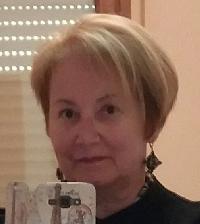| Páginas no tópico: < [1 2 3 4 5] > | Can someone be a native speaker of more than one language? Tópico cartaz: Spring City (X)
|
|---|
Rustam Nasyrov 
Canadá
Local time: 17:44
Membro (2007)
uzbeque para russo
+ ...
| I don't think so | May 28, 2007 |
David Webb wrote: Rustam Nasyrov wrote:
Is there anybody who could tell me how can I add a second native language to my profile? Thanks
[Edited at 2007-05-28 07:01] Many people are doubting here that anyone can be a native speaker of two languages, so it seems odd to ask this sort of question.
Thank you for your comments, but I don't think it would seem odd especially to those who were born and raised up in former USSR. I could discuss with pleasure this issue with you, unfortunately I have no time at the moment. OK, I have received a telephone call from my proz.com friend and the problem is sorted out. Anyhow, thank you for this interesting thread.
| | | | | What about Welsh? | May 28, 2007 |
myrcarromero wrote:
There are some cases, very few, but they are, of people born, raised and literated in bilingual even trilingual communities. Switzerland, Belgium, North European Countries, and in Spain, Catalonia, Galicia, Basque Country. They learn two or three languages since they born, and feel the same confidence in both languages. With Gaelic and the languages spoken in Ireland, Scotland, I know that the local governments are trying to do the same, but I am not aware of the results so far.
No-one has mentioned Welsh. Although I don't speak Welsh, I know from visits to North Wales that many people (including professionals) appear to be perfectly bi-lingual in both Welsh and English and should surely be considered to have both as their native tongue?
Regards,
Jenny.
P.S. On one visit I found a smallish book entitled "Welsh in a Week". I embarked, but soon found that it would probably take me a hundred years.
| | | | Lia Fail (X) 
Espanha
Local time: 23:44
espanhol para inglês
+ ...
| maybe not quite dying... | May 28, 2007 |
Henry Hinds wrote:
This started off with the Irish language and then went into other areas but with some great debate and comments I think have been quite worthy.
Getting back to the original subject, it is surely the language spoken by many of my ancestors which I have never heard, not even in a dream.
Sad to hear it is in effect dying out.
Rather it's limping along...however, there are promising signs of a "revival" even if somewhat intellectual or tokenistic, as David says. There is also a growing awareness in this globalised world that to lose a language is to lose a culture, and as the world becomes more globalised there will probably be an increasing interest in the elements that distinguish cultures (isn't it rotten to visit a foreign country and see shops and bars and eateries that are the same as in one's own country ... and for example, Irish bars - multinational-backed - in Barcelona are simply a McDonaldisation of Irish social culture)
Finally, the last 20 years have seen great changes in the Irish collective psyche as a consequence of economic propsperity. It no longer has the inferiority complex it had in regard to England, and is becoming increasingly proud of all the manifestations that make it different from England, such as music (flourishing), dance (has made a huge comeback), and the Irish language (it's fashionable to attend bilingual schools)
| | | | | My 2 cents from Ireland :-) | May 28, 2007 |
David Webb wrote:
Henry, it won't go completely. Although a bit tokenistic, there is just enough government support to keep it going in some form. But the real areas where Irish is meant to be spoken - the Gaeltacht - with a population of 80,000+ have only 17,000 speaking Irish every day outside the school system according to the 2006 census. So even in the Irish-speaking areas, most people are never speaking Irish, or at least not on a daily basis.
Eventually, there may be no actual Irish-speaking areas left. But there is a network of schools teaching through Irish - and at least one in every county including Northern Ireland. 30,000 children attend primary school in Irish (not including children in the Gaeltacht) and 6,000 attend middle school in Irish (again, not including children in the Gaeltacht). So, although someone in Dublin will not be living in an Irish-speaking area, it is quite feasible for Irish to be his home language and for him to be attending an Irish-language school. These people probably will speak fluently but probably won't be full-blown native speakers as we have discussed.
Another "issue" with Irish is the government's mandating of an Official Standard Irish that is not spoken in any real Irish-speaking district, as it is a mixture of bits taken from different dialects. People who want to get jobs in Irish have to accept this standard, as it is the only language legislation is being produced in, and the Irish-language school system has led to the emergence of people who speak this artifical dialect fluently or even neo-natively. The genuine good Irish is spoken in County Cork, and was the basis of grammar textbooks published up until the 1940s (I have had to invest in a lot of antiquarian books) and also the basis of much of the revival literature. But when the numbers of native speakers in Cork began to decline, the government reoriented the standard away to a compromise between Cork and Galway and the very odd nod to County Donegal, producing the artificial compromise. The situation is much as if English declined in England, and the number of speakers who said "is not" fell quite low, but there was a larger population of people who spoke English and said "ain't" and so the government declared that "ain't" was standard English. Many learners refuse to learn standard Irish for this reason, owing to its highly dumbed-down quality. It has incorporated too many points from Galway, where a form of Irish that on historical grounds can be said to be completely ungrammatical is spoken.
First of all, maith thú a Dhaithí. I think it is great that you are interested in Irish Gaelic.
I subscribe to the view that one should only translate into their native language (English in my case), yet so far this year, the vast majority of clients want me to translate their texts into Irish. It is a market that I cannot afford to ignore.
For the record, I only accept such assignments if I think I can handle it and I always get it proofed prior to delivery. I make it clear to clients and on my Proz site that I am not a native speaker, but that I work with an Irish proofreader. Generally, clients are OK with this and I'm usually booked a couple of weeks in advance.
For some reason, Gaelgóirs are not entering the field of translation. They often become teachers, civil servants or they emigrate. So that leaves the rest of us.
I went to the Aran Islands in April to refresh my oral Irish skills and I was extremely frustrated by the fact that when I tried to speak Irish to people (nothing complicated, just ordering drinks or making small talk), they replied back to me in English! I really had to persevere, without crossing the line into being pushy.
I only heard one old man speak in Gaelic to a neighbour in the village. The rest of time, I heard English all around me.
As you know, the Aran Islands are supposed to be one of the main Irish-speaking districts (Gaeltacht). I couldn't believe it. I actually spoke more German and English in the Aran Islands than Gaelic! I was ranting and raving in the car all the way back to Dublin about it. I've just finished a two-year postgrad diploma in Irish and I couldn't help questioning why do I bother learning this language if the native speakers don't bother.
It seems to me that the language is enjoying a small revival everywhere else except in the Gaeltacht. I can go to an Irish-speaking cafés and have Irish-speaking nights out in the heart of Dublin city but I couldn't get that in the Aran Islands.
For me, it reinforced a concept of Irish as a "secret" language, for the want of a better description, one that native speakers are reluctant to share.
David, have you subscribed to any Irish-language podcasts like "An Líonra Sóisialta"? Do you listen to Raidió na Gaeltachta online? They have a programme called "Guth Mhúscraí" on Saturdays. It is a good place to get the Cork blás that you're looking for.
Ádh mór ort,
Órla
| | |
|
|
|
Spring City (X) 
Local time: 05:44
chinês para inglês
+ ...
CRIADOR(A) DO TÓPICO
Yes, I know about Guth Mhúscraí. Actually I own a Yahoo Group called "Muskerry" and we are studying Irish - get this - using a book written in Polish, but we are lucky to have a Lithuanian on board who is helping us.
I'm surprised there is demand for Irish into English at all, but as you said the need for official laws etc in Irish makes an English into Irish job viable.
As far as the Aran Islands - be pushy. It's what they're getting their Gaeltacht grants for. If ... See more Yes, I know about Guth Mhúscraí. Actually I own a Yahoo Group called "Muskerry" and we are studying Irish - get this - using a book written in Polish, but we are lucky to have a Lithuanian on board who is helping us.
I'm surprised there is demand for Irish into English at all, but as you said the need for official laws etc in Irish makes an English into Irish job viable.
As far as the Aran Islands - be pushy. It's what they're getting their Gaeltacht grants for. If all else fails, tell them you are Latvian and can't speak English... ▲ Collapse
| | | |
David Webb wrote:
Yes, I know about Guth Mhúscraí. Actually I own a Yahoo Group called "Muskerry" and we are studying Irish - get this - using a book written in Polish, but we are lucky to have a Lithuanian on board who is helping us.
I'm surprised there is demand for Irish into English at all, but as you said the need for official laws etc in Irish makes an English into Irish job viable.
As far as the Aran Islands - be pushy. It's what they're getting their Gaeltacht grants for. If all else fails, tell them you are Latvian and can't speak English...
I've only done a handful of jobs from Irish to English, you certainly wouldn't want to rely on that pair from a commercial point of view
I'm astounded that there is a book in Polish about an Irish dialect. I had no idea.
That's the thing that frustrated me in the Islands, they want us to come and attend their Irish language schools but then they won't speak it to you outside of class, so you end up speaking broken Irish with the other students. Not my cuppa tea.
[Edited at 2007-05-28 12:37]
| | | | | Native indeed... | May 28, 2007 |
Hi there,
This topic is very interesting and arises much debate.
My personal experience: I was born in Argentina, where I studied at an English School named "Blair House School" (Los Cocos City, Córdoba). Even though I didn't achieve total command of English while studying there from the age of 6 to 12, it surely built solid foundations for my present fair understanding of the English Language.
However, that's not the main point: the fact is, at the age of... See more Hi there,
This topic is very interesting and arises much debate.
My personal experience: I was born in Argentina, where I studied at an English School named "Blair House School" (Los Cocos City, Córdoba). Even though I didn't achieve total command of English while studying there from the age of 6 to 12, it surely built solid foundations for my present fair understanding of the English Language.
However, that's not the main point: the fact is, at the age of 13 I moved with my family to Brazil, Rio de Janeiro.
As we arrived, we didn't speak a word in Portuguese - apart from having heard "how it sounds" while listening to some Brazilian music we used to appreciate in Argentina.
My parents kept their Castellano mindset; my mother, now 69 years old), has quite a good command of Portuguese vocabulary but speaks with an unmistakable accent.
After 1 year without going to school - at first we weren't even able to buy bread and milk at the grocery!! - my sister and I had the opportunity to go to local school and we catched up very well, thanks to excellent teachers and, in parallel, listening to the radio, watching TV and practicing as much as possible, trying to keep self-criticism "power off".
As a result of this learning process, people say I have no accent at all, and my oral/ written expression is totally native-like; normally no one gets to know my Argentinian origin unless I reveal my "secret".
Within this context, I can say - without risk of being over-confident - that I'm able to express myself in Portuguese with the same fluency as in my (geographically speaking) native language.
When thinking for myself, my ideas drift almost unconsciously between Portuguese and Spanish, and I even "dream" in both languages.
In my opinion, that looks much like being "native speaker" in both.
Important remark: I really love learning languages and think that the human mind is capable of learning anyting, as long as one is sincerely interested in the matter and invests the required effort in achieving the goal.
Kindest regards/ cordiales saludos,
Halevy.
Mech. Engineer
Rio de Janeiro - Brazil. ▲ Collapse
| | | | Spring City (X) 
Local time: 05:44
chinês para inglês
+ ...
CRIADOR(A) DO TÓPICO | A partial non-sequitur? | May 28, 2007 |
Within this context, I can say - without risk of being over-confident - that I'm able to express myself in Portuguese with the same fluency as in my (geographically speaking) native language.
The point is that having missed out on several years' schooling in Spanish, you may find that it is your Spanish that has lacunae. As we have said in the thread (how much of it did you read?) the question relates not to native ability as such but the ability of an educated native speaker who has gone right through the education system.
[Edited at 2007-05-28 13:07]
| | |
|
|
|
Christine Schmit (X) 
Luxemburgo
alemão para francês
+ ...
I consider myself to be bilingual (French and Luxembourgish), and a lot of people here in Luxembourg do consider themselves as being even trilingual (German, French and Luxembourgish which are the 3 official languages), although I don't believe anybody can really be 100 % bilingual or trilingual. How many monolingual people have a 100 % mastery of their language? Having a perfect, really perfect 100 % command of a language just does not exist, not even if you just speak one language. Nobody can ... See more I consider myself to be bilingual (French and Luxembourgish), and a lot of people here in Luxembourg do consider themselves as being even trilingual (German, French and Luxembourgish which are the 3 official languages), although I don't believe anybody can really be 100 % bilingual or trilingual. How many monolingual people have a 100 % mastery of their language? Having a perfect, really perfect 100 % command of a language just does not exist, not even if you just speak one language. Nobody can know everything in a language.
In my case, I was born in Luxembourg, both my parents are Luxembourgish and Luxembourgish is my first language. In school, I first learned to read and write in German, then French (not Luxembourgish!)
I learned German about a year before I learned French, but I consider French as my second native language, not German! I know this is very strange, but I have always felt much closer to the French language and culture and studied at University in French (translation into French). So all my formal schooling from elementary school to University was mostly in French and partly in German.
Luxembourgish is not much used at school and it is mostly a spoken language. The language therefore lacks a lot of specialized vocabulary which is why translating into Luxembourgish is more difficult for me (or anybody) than into French.
So, to add to the complexity of the topic, I think I could say that Luxembourgish is my "spoken native language" and French my "written native language"! I would be interested to know if other speakers of minority and mostly spoken language, see their situation in the same way.
Christine ▲ Collapse
| | | | Roberto Rey 
Colômbia
Local time: 16:44
Membro (2007)
espanhol para inglês
+ ...
| I'm also from Mars | May 28, 2007 |
quote/ When I read your questions (and their underlying assumptions), then surely I am from Mars.
Native French and English speaker, but born in Vietnam - and my Vietnamese is rusty as all get-out. Even if I spent the next 20 years there, I would never reach native proficiency and would never dare claim to have it. /quote
I was Born in Colombia, at 4, lived in the US until my late teens, Spanish at home, English at school, came back to Colombia and polished my Spanish.... See more quote/ When I read your questions (and their underlying assumptions), then surely I am from Mars.
Native French and English speaker, but born in Vietnam - and my Vietnamese is rusty as all get-out. Even if I spent the next 20 years there, I would never reach native proficiency and would never dare claim to have it. /quote
I was Born in Colombia, at 4, lived in the US until my late teens, Spanish at home, English at school, came back to Colombia and polished my Spanish..what am I? Mars then...
[Edited at 2007-05-28 14:28] ▲ Collapse
| | | | Irene N
Estados Unidos
Local time: 16:44
inglês para russo
+ ...
| Terry, guess what! | May 28, 2007 |
Terry Richards wrote:
Another (rather interesting) example, I am currently taking a medication that has a side-effect that affects my use of language. This side effect has been fairly severe in my case but, rather oddly, only my English (my native language) is affected. Explain that one!
3 years ago my colleague sustained a severe head trauma followed by a surgery with a piece of his skull cut out and later put back in place. He was completely unconcsious for a couple of days. Being a native Russian, he speaks absolutely beautiful English, works in very hard technical fields and lives in the States for nearly 20 years. When he woke up in the hospital he found out that he had forgotten English! Completely. Thank God it came back to him in a week or so but he, and we all, have learned from the doctors that second language learned later in life is kept in the other hemisphere of our brain than the first one we speak after we are born. Can't put it any more scientifically but this is a fact.
Our own brain knows best, which language is our native. Weird...
[Edited at 2007-05-28 16:35]
| | | | | Maybe I still know my native language | May 28, 2007 |
Kim Metzger wrote:
Dictionary of Language Teaching and Applied Linguistics
Native language: the language which a person acquires in early childhood because it is spoken in the family and/or it is the language of the country where he or she is living. The native language is often the first language a child acquires but there are exceptions. Children may, for instance, first acquire some knowledge of another language from a nurse or an older relative and only later on acquire a second one which they consider their native language. Sometimes, this term is used synonymously with FIRST LANGUAGE.
Native speaker: a person considered as a speaker of his or her native language. The intuition of a native speaker about the structure of his or her language is one basis for establishing or confirming the rules of the grammar. A native speaker is said to speak his or her native language "natively".
[Edited at 2007-05-27 18:27]
Having two native languages is not uncommon, especially when you are born on a border or live in a country where two languages are used (Canada I suppose).
My native language is german because even if I am born in France, I used to live during my childhood in Sarreguemines, in a family where the spoken language was a german dialect. Due to the historical context of this area, my grandmother did not speak french and I used to speak the dialect with her and with my aunt and my cousin. At ten I spoke fluently the Hochdeutsch (german) but learned french at school. Then we moved and I spoke french with my mother and my father and gradually lost the habit to speak german, so that I think I don't know it anymore and cannot consider myself as a german-french bilingual.
But I'm sure that you never forget your native language completely and that having two native languages makes it easier to learn a third or fourth language.
We had a family meeting last year in Metz and I realized with surprise that my cousins still speak the dialect to each other and that I understood nearly anything. This was quite puzzling!
| | |
|
|
|
Spring City (X) 
Local time: 05:44
chinês para inglês
+ ...
CRIADOR(A) DO TÓPICO | Kim has a point | May 28, 2007 |
yes, native is about the native feel for the language that you only get if it is your first language. To that extent, maybe it is not learnt. But the issue is complicated by the fact that generally speaking, if you live in a community where the main language is your language, as most people always used to - foreign travel etc is something that has developed since the 1970s - you would speak the language natively and then be educated in the standard and literary version of it, read older versions... See more yes, native is about the native feel for the language that you only get if it is your first language. To that extent, maybe it is not learnt. But the issue is complicated by the fact that generally speaking, if you live in a community where the main language is your language, as most people always used to - foreign travel etc is something that has developed since the 1970s - you would speak the language natively and then be educated in the standard and literary version of it, read older versions of it at school, be exposed to a range of accents andd dialects in the media etc and end up with a polished mother tongue.
Nowadays it is quite feasible for someone to speak Welsh until the age 5 - to be a native speaker of Welsh - go to a school where only English is spoken but still speak Welsh in the home, and end up with a first language that is not as developed as the 2nd language. I suppose when I say you can't be native in 2 languages, what I really mean is "you can't use 2 languages to the same level that I can use English", which is forcing an interpretation on top of the basic word.
I did say in the first sentence of the first post that this was a controversial topic. Take part in the discussion at your own peril. ▲ Collapse
| | | | Spring City (X) 
Local time: 05:44
chinês para inglês
+ ...
CRIADOR(A) DO TÓPICO | Native speakers are not all good translators | May 28, 2007 |
Kim Metzger wrote:
[
Native speaker by itself means simply that a person (as a rule) grew up speaking the language from childhood. It doesn't tell clients much about translation skills. That's an entirely different kettle of fish.
True. I am in a country that accepts virtually any native speaker as an English teacher with or without a TEFL certificate, without or without a degree etc. The awkward thing is that many of those "native" speakers could do with a brush-up course in English themselves!
| | | | | Possible, but not automatic | May 28, 2007 |
When asked, I usually say that I am bilingual in Spanish and Galician (one of the cases mentioned here). My education (from Kindergarten to university) has been in both languages (not always 50% however) and during the 20-something years I lived in Galicia I heard, read and spoke both of them on a daily basis. Now I feel I am able to translate professionally and write at a high educated level in both languages.
Is that easy? Not at all. Already as a child as a teenager I considered... See more When asked, I usually say that I am bilingual in Spanish and Galician (one of the cases mentioned here). My education (from Kindergarten to university) has been in both languages (not always 50% however) and during the 20-something years I lived in Galicia I heard, read and spoke both of them on a daily basis. Now I feel I am able to translate professionally and write at a high educated level in both languages.
Is that easy? Not at all. Already as a child as a teenager I considered myself bilingual, but I didn't imagine how many time and effort would I have to devote to keep both languages at the same level. In fact, most people in Galicia would tell you they are bilingual, and it may be true in the sense that they manage to speak both Galician and Spanish fluently and without having to look for words; but they lack a cultivate vocabulary in one of the languages, or they can't write one of them at a high educated level. Does that matter? No. Not everybody wants to be a translator, a writer or a journalist. But, to some extent, people seem to think that being bilingual is just plain easy and that native languages do not need maintenance. At university, I took a course of German language in which I met some students who claimed to be bilingual (that is, they had been born in Switzerland or Germany to Spanish parents, and have come back to Spain when they were 10 or 12 or 14). Guess what... at the end of the year my written exam (and I had started learning German at 18) was better than theirs - although they spoke perfectly fluent German, they had not bothered to cultivate their written language.
So I think that being in contact with 2 languages from your birth and even being schooled in both of them does not make yourself automatically a bilingual... it is a prerrequisite, of course, but not everybody seizes the opportunity.
I do think however that there is always a dominant language and a weaker language (in the case of bilingual people raised with both languages from birth, that is), but I think that there's a certain flexibility in it and that they can be inverted. I think that my dominant language is Spanish because it's the language spoken in my household, but for some periods of time it turned to be Galician, because I was more embedded into this language than into Spanish... but I don't think that this inversion could happen between say English (a non-native language to me by all means) and Spanish.
[Editado a las 2007-05-28 18:02] ▲ Collapse
| | | | | Páginas no tópico: < [1 2 3 4 5] > | To report site rules violations or get help, contact a site moderator: You can also contact site staff by submitting a support request » Can someone be a native speaker of more than one language? | CafeTran Espresso | You've never met a CAT tool this clever!
Translate faster & easier, using a sophisticated CAT tool built by a translator / developer.
Accept jobs from clients who use Trados, MemoQ, Wordfast & major CAT tools.
Download and start using CafeTran Espresso -- for free
Buy now! » |
| | TM-Town | Manage your TMs and Terms ... and boost your translation business
Are you ready for something fresh in the industry? TM-Town is a unique new site for you -- the freelance translator -- to store, manage and share translation memories (TMs) and glossaries...and potentially meet new clients on the basis of your prior work.
More info » |
|
| | | | X Sign in to your ProZ.com account... | | | | | |










